The story of the Bin Ladens it turns out is the story of modern Saudi Arabia, of the rise of that nation in the early 1900s to our present day. I much enjoyed especially the early portions of the kingdom's and the family's history. Muhammed Bin Laden, the family's patriarch, was not even a Saudi but an orphan from Yemen who knew how to work and did it well, first establishing himself with American companies and then starting his own company. As a company owner, he was a man who, when he or his company lacked the skills needed to do a job, took the job anyway--and found ways to contract out the job to people who did know how. And he was a man blessed with the good fortune of having the favor of the Saudi royal family, for it was through his work on construction projects for them that he would make his billions.
He would also have fifty-four children. As a fairly devout Muslim, who would help to refurbish the holy cities of Mecca and Medina, he could and would take four wives, as allowed in Islamic tradition. (What strikes me as interesting in this is that the men often take not just four wives in a lifetime but four wives at a time. Divorce seems fairly common, so that, where in the United States, we have serial monogamy because of rampant divorce, among some circles in the Islamic world you have essentially serial polygamy.)
Those children would be bequeathed a huge fortune when Mohammed died in a place crash. Mohammed's oldest son Salem would then take the reigns of the family and the family businesses. Salem, as the book shows, was a natural salesman--and, as many salesmen are, a kind of party animal with a tremendous sense of humor. Salem's own recklessness would lead to another tragedy in a plane twenty years later.
Under Bakr, Salem's half-brother, the family businesses would move toward being more professional, more corporate--or so, that was my impression from the book. At this point, the book becomes a bit drier as a result, though still quite fascinating. For this is also the time when Osama begins to create problems for the Saudis and for his own family. And perhaps one of the most interesting themes throughout the whole book is the way in which this one family straddles the Muslim and Western worlds, how some are very devout, conservative Muslims, some Muslims in seeming name only, and most Muslims somewhere in the middle, each of them donning different personalities as necessary in and out of Saudi Arabia.
And finally there are the Bin Ladens themselves, the awkwardness that one black sheep family member can create for all the others, the loyalty to one another, the devotion to the royal family and to Islam itself. This is as full and textured a portrait one could expect in six hundred pages, and so far the best of the four historical books I've read that have come out of our obsession with September 11, save perhaps the 9/11 Commission Report, itself an amazing work.
Subscribe to:
Post Comments (Atom)







No comments:
Post a Comment